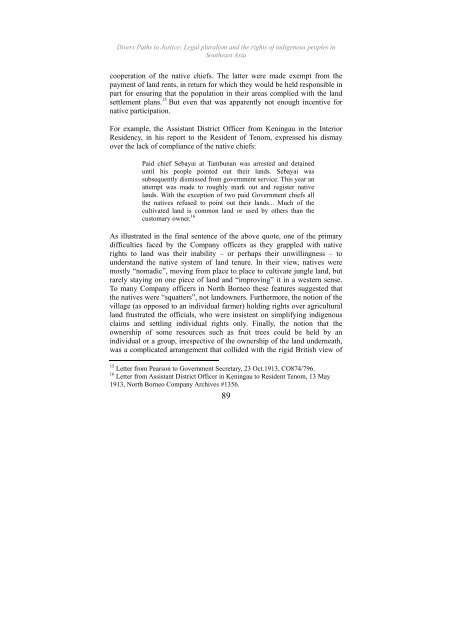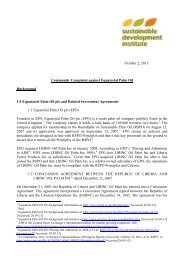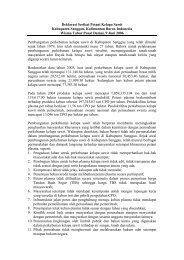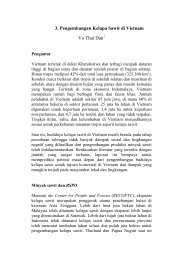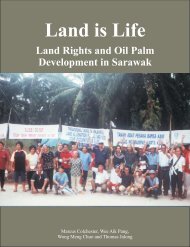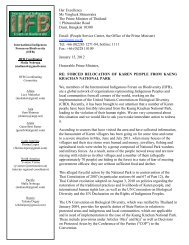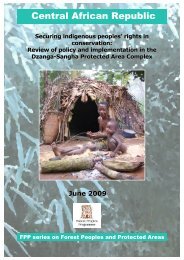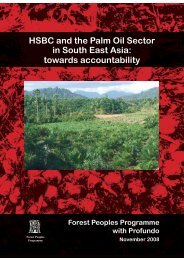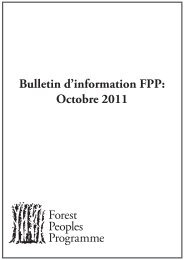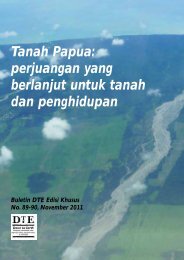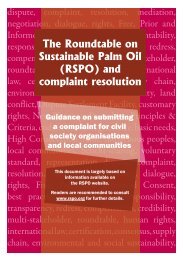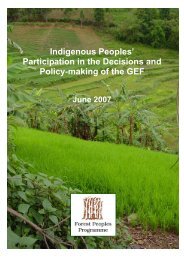Divers Paths to Justice - English - Forest Peoples Programme
Divers Paths to Justice - English - Forest Peoples Programme
Divers Paths to Justice - English - Forest Peoples Programme
Create successful ePaper yourself
Turn your PDF publications into a flip-book with our unique Google optimized e-Paper software.
<strong>Divers</strong> <strong>Paths</strong> <strong>to</strong> <strong>Justice</strong>: Legal pluralism and the rights of indigenous peoples inSoutheast Asiacooperation of the native chiefs. The latter were made exempt from thepayment of land rents, in return for which they would be held responsible inpart for ensuring that the population in their areas complied with the landsettlement plans. 15 But even that was apparently not enough incentive fornative participation.For example, the Assistant District Officer from Keningau in the InteriorResidency, in his report <strong>to</strong> the Resident of Tenom, expressed his dismayover the lack of compliance of the native chiefs:Paid chief Sebayai at Tambunan was arrested and detaineduntil his people pointed out their lands. Sebayai wassubsequently dismissed from government service. This year anattempt was made <strong>to</strong> roughly mark out and register nativelands. With the exception of two paid Government chiefs allthe natives refused <strong>to</strong> point out their lands... Much of thecultivated land is common land or used by others than thecus<strong>to</strong>mary owner. 16As illustrated in the final sentence of the above quote, one of the primarydifficulties faced by the Company officers as they grappled with nativerights <strong>to</strong> land was their inability – or perhaps their unwillingness – <strong>to</strong>understand the native system of land tenure. In their view, natives weremostly “nomadic”, moving from place <strong>to</strong> place <strong>to</strong> cultivate jungle land, butrarely staying on one piece of land and “improving” it in a western sense.To many Company officers in North Borneo these features suggested thatthe natives were “squatters”, not landowners. Furthermore, the notion of thevillage (as opposed <strong>to</strong> an individual farmer) holding rights over agriculturalland frustrated the officials, who were insistent on simplifying indigenousclaims and settling individual rights only. Finally, the notion that theownership of some resources such as fruit trees could be held by anindividual or a group, irrespective of the ownership of the land underneath,was a complicated arrangement that collided with the rigid British view of15 Letter from Pearson <strong>to</strong> Government Secretary, 23 Oct.1913, CO874/796.16 Letter from Assistant District Officer in Keningau <strong>to</strong> Resident Tenom, 13 May1913, North Borneo Company Archives #1356.89


